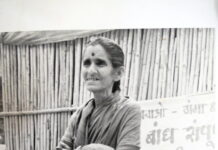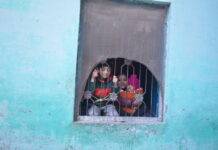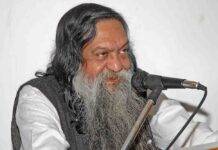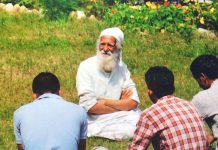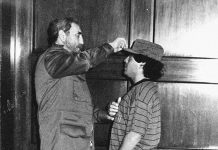Sridev Suman is not widely known today, but he was one of the most endearing and inspiring figures of our freedom movement who achieved martyrdom after fasting for 84 days in Tehri jail at the young age of only 29.
Apart from the main freedom movement in India directly ruled by Britain, there were several smaller freedom movements in those kingdoms of India which were supported by British rule. Here also the repression could be very cruel. This is evident from the struggles led by Sridev Suman in Tehri, a kingdom in Himalayan region. Sridev Suman emerges as a very brave and inspiring representative of these struggles in various kingdoms.
He was also a poet, a writer and very endearing young man, known to be extremely soft spoken and friendly. He was a very considerate and affectionate husband. He had very deep love for his mother and he always sought solace at her feet in the middle of the extremely difficult life that he had chosen for himself.
Suman was born on May 25, 1915 in Jaul village of Tehri Garhwal district. His father was a dedicated ayurvedic doctor who accepted great risks while visiting seriously ill patients in remote villages. While treatment cholera patients he himself contacted the disease and died. Suman was a 3-year child at this time. His mother accepted very bravely the responsibility of bringing up four small children.
Suman was sent to Dehradun for studying. At a very early age of 14 he was attracted towards the freedom movement led by Mahatma Gandhi. For participating in the Salt Satyagraha phase of freedom movement he was imprisoned for two months in jail and beaten by canes.
Suman then took admission in Oriental College in Lahore for higher studies, but was expelled soon for his important role in a students’ movement.
Suman then moved to Delhi to live with brother Parshuram. Here his talent as a writer and poet flowered and a selection of his poems ‘Suman Saurabh’ was published in 1922. He served in educational, literary and philanthropic institutions. His growing fame prompted the royals of his home-place Tehri to offer him a job which Suman declined, according preference to availability the opportunities to spend some days in the company of Mahatma Gandhi and Zakir Hussain. In 1936 he played a leading role in the establishing Garhwal Seva Sangh, which survives to this day under the name of Himalaya Seva Sangh.
At the age of 23 Suman was married to Vinaylakshmi and they were a very devoted couple. Both of them were keen that Vinaylakshmi should continue her education and she soon enrolled at Kankhal College (near Hardwar) where she followed Suman’s path in taking up work side-by-side to pay for her educational expenses. She was still studying here when Suman attained martyrdom in Tehri.
Suman soon attracted attention the level of national-level leaders like Jawaharlal Nehru at meetings of Congress party by his dedicated work as well as exceptional capability to present the main issues of his region. Suman was given a leading role when Praja Mandal for Tehri kingdom was formed at a meeting in Dehradun in 1939 (This was more or less equivalent to forming the local branch of Congress Party which led the freedom struggle at the national level).
Thus at the young age of 24 Suman had simply too many responsibilities – rushing at times to Delhi or Shimla or Wardha for consultations with senior leaders . Yet he found time to regularly meet villagers of his region. Sunderlal Bahuguna, who later become known worldwide as leader of Chipko movement, recalls how at the age of 12 or 13 he first saw Suman when Suman had come to meet the villagers there. It was this meeting which inspired the young boy and pushed him towards the freedom movement at a very young age. To this day Sundarlal remembers Suman as the teacher who remained an inspiration source for him throughout his life. Several persons, including senior freedom movement figures like Chandra Singh Garhwali and Paripoornanand Painyuli, have left behind accounts of those days which related what a deep and inspiring impact this young man had made on them. Despite his growing fame he led an austere life, often preferring to walk long distances to save a little money which he would then donate to Praja Mandal. All this while his dearest wife struggled to meet educational expenses at Kankhal. When his mother once complained in jest that he never gives anything to support her, he repled – you have two sons to support you, you mother, you try to think that you have donated me to those who have no one to support them.” He also found time to do selfless service for patients suffering from serious diseases and also for service in dalit settlements.
In Tehri forests rights were being trampled upon and when people gathered to protest against this, in Rawai, Diwan Chakradhar Juyal ordered armed men to fire on them ,killing many villagers. This tragic episode was known as Jalianwala Bagh of Garhwal. This was followed by a terrible clampdown on all democratic and protest activities, including entirely peaceful ones. Suman continued his work in difficult conditions, and prepared reports on the disturbing conditions in Tehri as well as in Dhami kingdom (near Shimla) where also people had been fired upon.
In 1940 a conference of migrant Garhwalis was held under the Presidentship of Suman in Delhi. He was also elected the convener of the Garhwal sub-division of Cangress Satyagraha Committee. He extended help to striking students of Tehri and travelled in Tehri villages taking the message of prohibition, Charkha and freedom movement. For some days he was detained by the police.
Meanwhile his writings also continued. In particular his writings on repression and freedom movement in kingdom areas played an important role. Gandhiji was so impressed by his articles on future of Hindi as national language that he invited him to Wardha.
In 1942 an all-India conference of people’s representatives from various kingdoms called upon their rulers to delink themselves from relationships with British governance and to move towards greater accountability towards their people. After returning from this conference Suman consulted his colleagues and sent a memorandum to Tehri ruler along similar lines, also asking for ending forced labour (begar) and some unfair taxes. To take this forward a conference was announced in Tehri but before Suman could reach Tehri for this event he was arrested at Dev Prayag. He was sent to Dehradun jail and then to Agra jail. Several other freedom fighters of the region were also arrested. His jail-mates in Agra later recalled how Suman had won the respect of all other prisoners in a short time. In adverse conditions he continued his study of spirituality, medicine and freedom movement in kingdoms even in jail. By this time he had emerged as one of the must well-informed persons on freedom movements in kingdoms.
He was released after nearly 14 months of imprisonment and went to Hardwar to meet his wife and families of several imprisoned freedom-fighters. Then he proceeded to Tehri but was stopped at Chamba and sent to Tehri jail, just 41 days after his release from Agra Jail. Tehri jail had become notorious for its revolting conditions and ill-treatment of political prisoners. There were special instructions to ill-treat and torture Suman to somehow remove him from freedom struggle.
When Suman refused to sign a letter seeking forgiveness he was caned and very heavy iron chains were locked on his feel. Cold war was thrown on his body on very cold rights. He was placed in an isolated cell.
When a completely unfair trial based on false accusations was started, Suman raised demands of a fair trial,lifting restrictions on Praja Mandal and better treatment of jail inmates. When he did not get any response, he started an indefinite fast on May 3 1944.
To break his fast he was ill-treated and tortured even more. By this time his disciple Sunderlal Bahuguna had emerged as an activist-journalist. Sunderlal managed to publish news of his ill-treatment so that other parts of the country could know about this. When this news was published Sunderlal was also arrested.
The General Minister of Tehri Pandit Mouli Chandra tried for his release but when he could not succeed he resigned.
The ill-treatments and torture of Suman continued unabated. As a result he breathed his last on 25 July 1944 after a historic fast of 84 days. His dead body was thrown into the Ganga river.
When this news spread condolence and protest meetings were held in several parts of the country including Delhi, Mumbai, Karachi, Lahore, Varanasi, Hardwar and Dehradun. Special committees were formed by people’s organisations to investigate the circumstances of his death and their reports condemned the ill-treatment, torture arbitrary arrest and unfair trial.
The shocking injustice towards a saintly person like Suman leading to his martyrdom at a very young age opened the eyes of the people to the real, highly unjust and repressive character of the kingdom so that more and more people started opposing it and the freedom movement gathered strength. In his death as in his life Suman strengthened the movement for justice and freedom.
His writings reveal his deep commitment to justice, equality and social reform. He wrote repeatedly about protecting the rights of women, farmers and landless dalits. He was committed to a health system that reached out to remote villages and high priority to improved education for all. He was strongly against the spread of alcoholism and regarded this a great evil. He was committed to strengthening self-reliance of rural communities symbolised by the charkha (spinning-wheel). After independence there was an anti-liquor movement in Badshahi Thaul near Tehri. In this movement 72 year old mother of Sridev Suman played an important inspirational role despite being ill. In the course of the movement someone asked her about Suman. She pointed towards all the young anti-liquor movement activists standing near her. She said – they are all my Sumans.
Bharat Dogra freelance contributors who have been close to several social movements.

